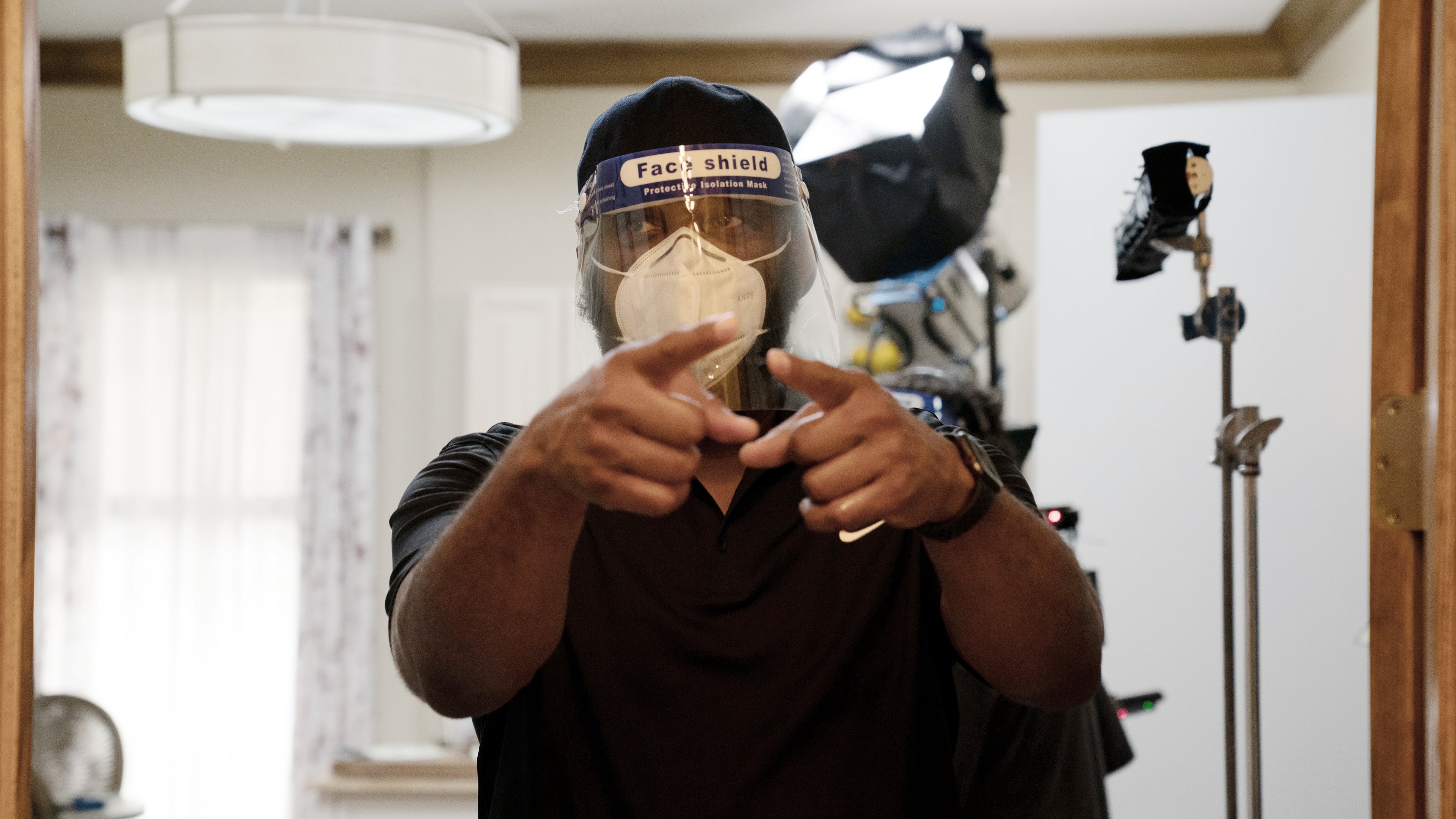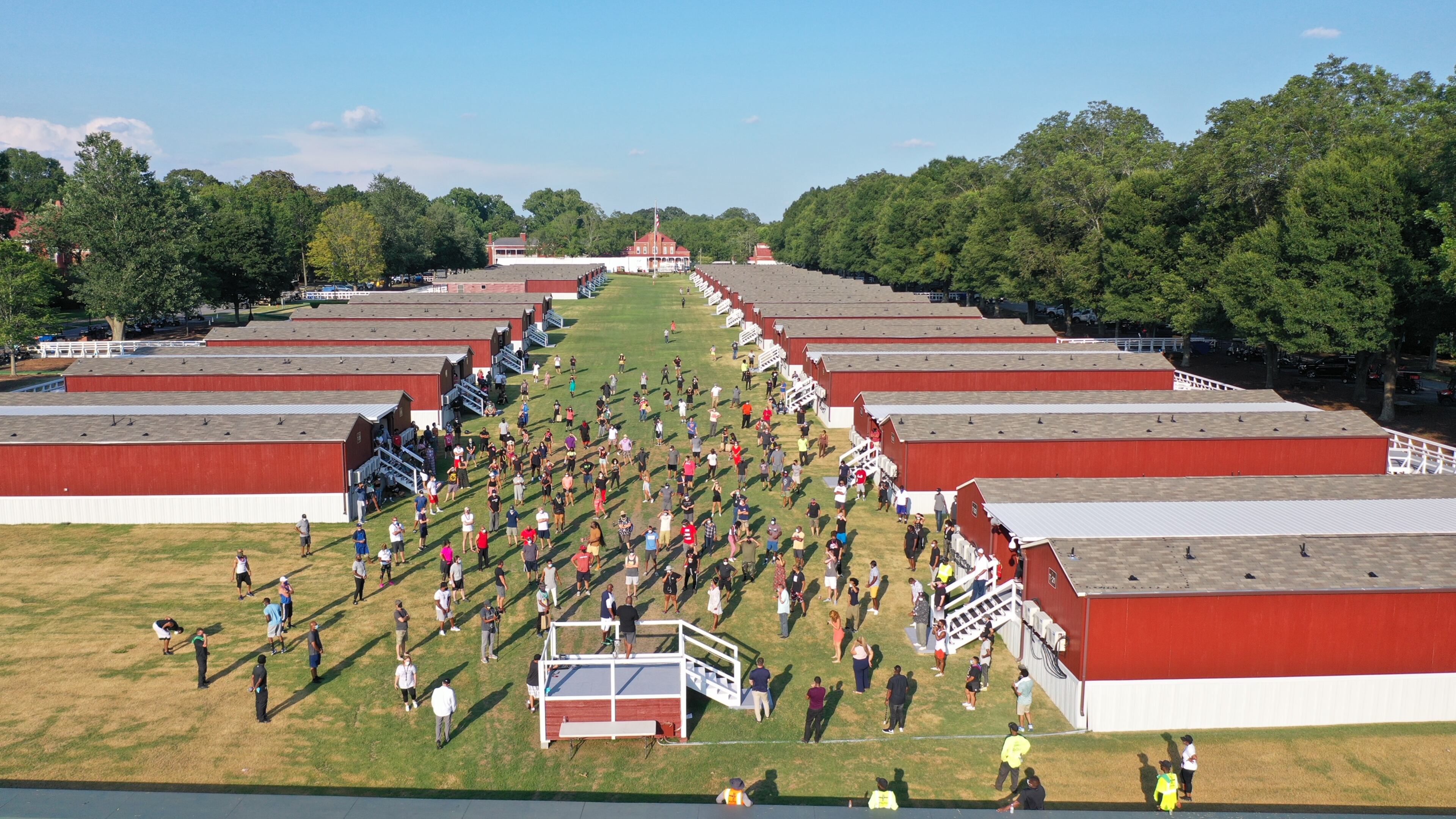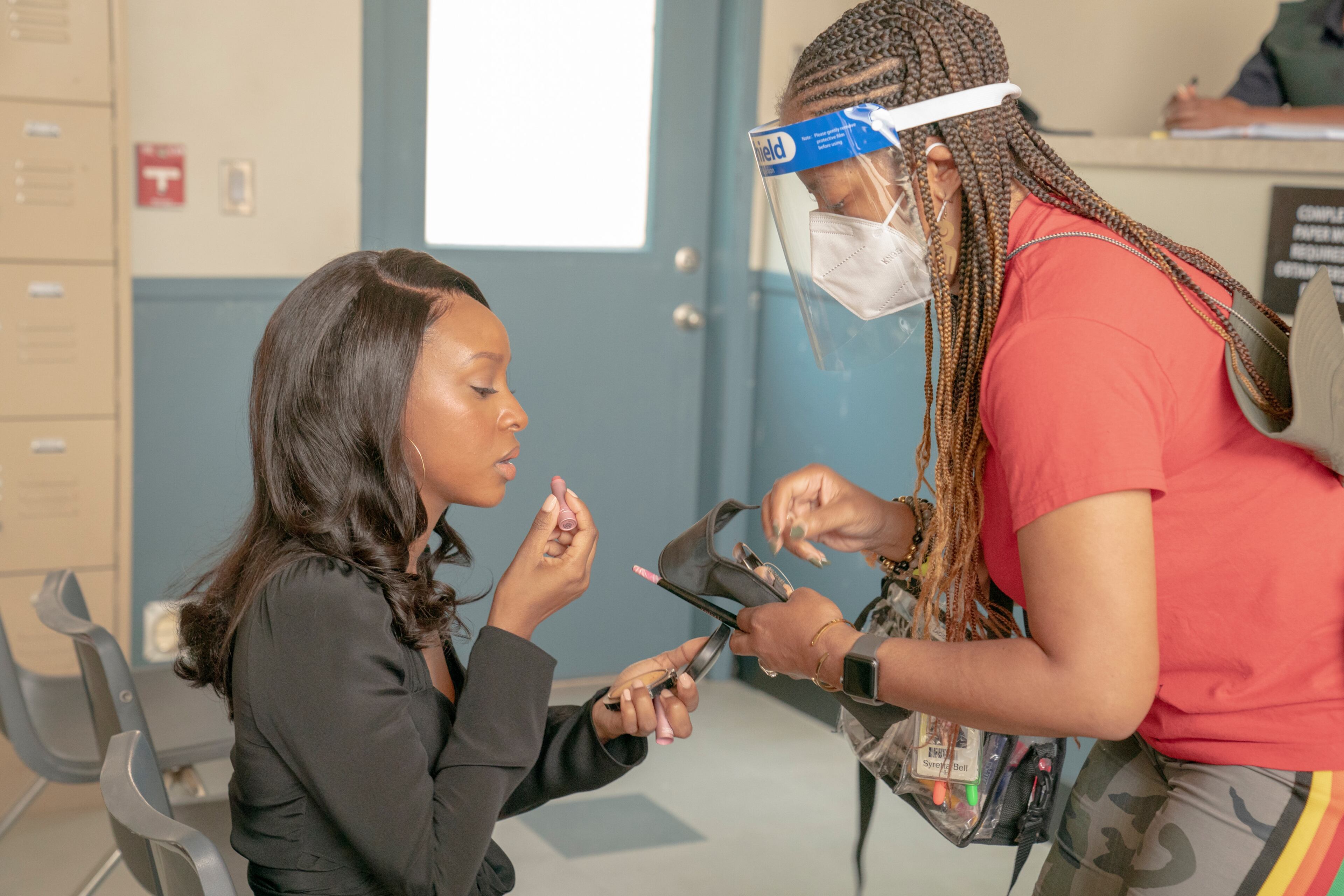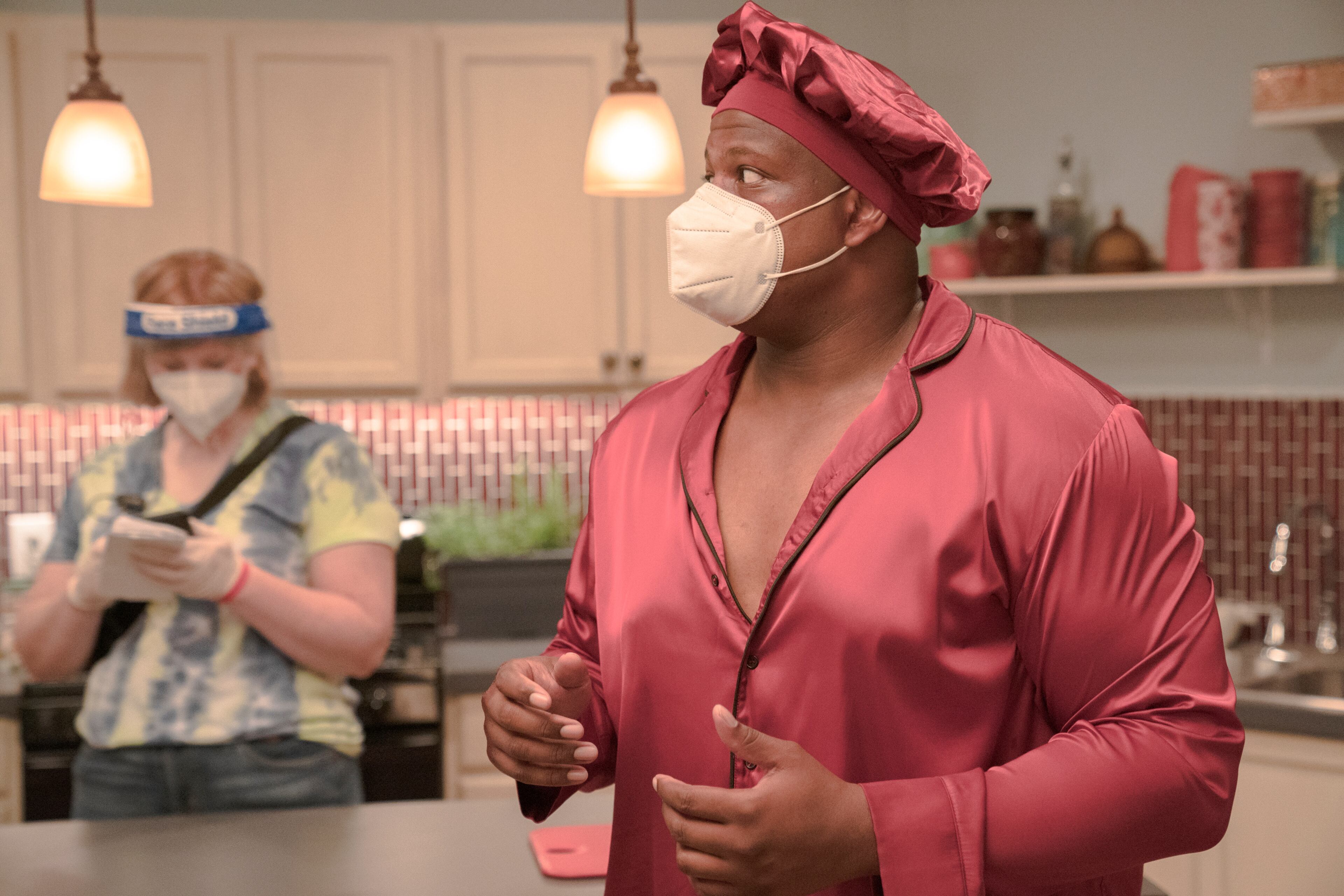Q&A with Tyler Perry about producing shows during a pandemic

Tyler Perry is back in business creating TV shows after four months off, turning his sprawling 330-acre studio operation into a sequestered island for 360 workers at a time.
He completed a second season of his BET relationship drama “Sistas” during the second half of July and is now prepping for his White House drama “The Oval,” which just concluded season one on BET and is set to return to production August 4.
So far, Perry said frequent testing and isolating everyone in one place has worked. During “Sistas,” nobody caught the virus and they were able to complete production on time.
“It went beautifully, even better than we expected,” said Michelle Sneed, Tyler Perry Studios’ president of production and development. Besides 60 units of housing already on site from the time when Tyler Perry Studios was an army base, Perry brought in 315 brand new manufactured homes and installed 40 washer/dryer units.
For two weeks, cast and crew turned Tyler Perry Studios into a 24/7 camp. People biked around in groups. There were sunrise and sunset yoga classes. They hosted outdoor movie nights and church services, live-streaming T.D. Jakes.

All the precautions greatly increased costs, adding $4.5 million to his budget per show per season, Perry said. For four different shows, he is setting aside well into seven figures on COVID-19 testing alone.
Sneed said the studio was using Emory University for testing early on but Emory was getting backlogged with a surge of cases last month. That delayed results when they first quarantined on campus and caused a lot of anxiety. They have since switched to private labs to ensure quicker turn-around time for results.
Here are highlights of a conversation The Atlanta Journal-Constitution had with him earlier this week:
Q: Having this conversation a year ago would have been absurd, right? The whole concept of what you’re doing right now would not make any sense.
Perry: Yeah. You see all of us walking around in these masks and face shields and all this other stuff like we’re all in outer space and it all seems weird.
Q: How do you even feel while you’re on set now?
Perry: For me, fortunately, I’ve done well enough to take the rest of the year off, for the next year, for the rest of my life if I felt like it. But I have all these people working for me who bought houses and cars and depend on this income. When they tell me about this stuff, they beam with pride about the things they bought and paying off their debts. I could sit somewhere waiting for a vaccine. But I had to come up with a plan to keep these people working. They are faithful and loyal. They deserve it. I’m sleeping among them and making it work.
Q: How much do the safety protocols slow production down?
Perry: We’re still the same pace. We lost 80 to 100 crew members because we didn’t have the housing for it. What takes longer is moving from location to location. Something that had taken 15 minutes is now taking 45. But the great thing about the crew I’m working with, the actors and my whole team here at TPS, once we get there, we’re moving to make up the time.
Q: Did you have to make any changes to your scripts to accommodate the pandemic and keep everyone safe?
Perry: All the scripts were written in January and February. [Perry writes them all himself.]... We test every four days to make sure the virus is not among us. The actors have been tested the past eight to 10 weeks so we had a record of all these negatives so that we could continue on the same path and not change anything in the scripts. Locations had to be scaled down because we couldn’t bring as many extras.
Q: How many background actors did you bring in?
Perry: We brought in 10. Sometimes we needed 20 or 30 so we had cast and crew be background and they gladly jumped in.

Q; What was it like living at Tyler Perry Studios all the time?
Perry: I rode my bike to set every day. It was joy for me. I never spent this much time here on a day-to-day basis seeing it in the mornings, seeing the sun set. It’s a glorious place. This place is a beautiful piece of property. I really got to know it intimately.
Q: It’s a large space, like 300 plus acres. I presume you didn’t feel claustrophobic?
Perry: Not at all. There was enough space for everybody. To see this campus come to life, I can only imagine what it was like when it was an army base having someone in every house, having people riding their bikes, exercising, jogging, hiking the back trails. It’s really amazing.
Q: How was the whole situation with food?
Perry: I’ve been talking to my team about that because we had great, great food trucks here and an alcohol truck. But I just thought next go around, we need a lot more healthy options because I put on a few pounds.

Q: Where did you actually stay?
Perry: I had a tour bus for ten years so I parked it in the middle of campus. I’ve been staying on it during this time. That’s always been home for me when I’m on the road [doing his “Madea” stage shows.] So it still feels like I’m home.
Q: Were there any situations that happened during this first go around that surprised you? Or do you feel you captured all the potential issues?
Perry: This was our training ground to make sure everything worked well. My TPS team was all over it. There was nothing that caught us by surprise except how much people drink in the evenings. But for the most part, we were ready.
Q: Since everyone was COVID free, were you able to interact normally on set?
Perry: Nothing about this was normal. It’s mandatory that you wear a mask or face shields when on set. [The exception is when actors are shooting a scene.] You had to have masks on all day long, which was trying for a lot of people. I completely understand why but it’s so important why we did it. I know for a fact that wearing a mask helps stop the spread.
Q: Did you start planning this from the start of the pandemic?
Perry: We were supposed to start in March and that’s when everything started shutting down. I’m going to learn everything I can. I talked to Carlos Del Rio [an epidemiologist at Emory] and Sanjay Gupta [CNN’s chief medical correspondent]... I immediately started working on a plan because I was waiting for a federal response. When I realized none was coming, I knew we couldn’t wait around forever. So let’s go for it.

Q: What was the toughest part for you during the quarantine? You’re a busy man. Were you able to funnel your energies elsewhere?
Perry: If you knew the scripts I have written while waiting for this thing, I’m ready for all of 2023!
Q: Great! So you were able to funnel your energies into the creative side and do some writing.
Perry: Yes. Absolutely. Had to. I got to spend a great deal of time with my son, which was great, but I actually had to have some writing going on. I wrote a couple of movies that I’m looking forward to shooting right away.
Q: With the pandemic and all the protests, how have you been dealing with it all emotionally?
Perry: It was very difficult when I wasn’t able to work and get people working. That’s always been the outlet. I’m very worried about the message being hijacked by people with ill intentions. Seeing the whole country galvanized to help fight against injustice I think is a wonderful thing.
Q: How was it writing that essay about racial injustice for People magazine? Was that helpful to you?
Perry: It was cathartic but it was also painful because one day I’m going to have to have that conversation with my son. He will need to know what’s going on out in the world.
Q: I know the amount of help society needs exceeds the reach of what any individual person can do. How are you deciding what types of charities to provide to? You could do a million things or you can do one thing.
Perry: It has to be something that moves me. Sometimes it’s a story, it’s a person, it’s someone in passing and it moves me. The thing about having the Atlanta Police Department pass out the gift cards to the community for groceries, I wanted to do something else for groceries after the Kroger/ Winn-Dixie thing. [He paid for all groceries purchased during a senior hour at markets in Atlanta and New Orleans.] I thought, why not get the police into the neighborhoods around the studio and other areas because what I wanted out of that was the police officers and the community standing together. I hoped that would send a clear message of unity and a bridge to getting this worked out. Nobody wants to talk to each other. Nobody wants to hear each other’s opinion in this day and age. I hope we all just start to listen to each other more.
Q: Getting back to production, you were able to sequester people at your studio. What lessons could you offer for other studios who can’t do that?
Perry: If you can’t quarantine, I think the only other answer is to test every day. If that’s not an option, I don’t know how people working this closely together could be safe. We really are working like ants. It’s a place where the virus could spread easily.
Q: There seem to be a lot of delays in testing.
Perry: We had been testing for six weeks [during pre-production] and having no delays at all. We were getting test results back the next day. But then our first day of check in, tests took 48 hours. That was longer than we expected. We expected results back in 12 hours. I can’t complain about this one. There are people who can’t get tests. They can’t get test results. They’re sitting waiting in lines for hours.
Q: The company you’re dealing with, can they get a decent turn around for you for “The Oval” as well?
Perry: We were working with Emory. They were amazing the entire time. Now we’ve switched to private labs. We have three private labs, one in Georgia, two that are out of state that have the capacity and ability to turn our test results back. It’s very very expensive. It’s in the millions to run these tests but if it’s to keep everyone safe, so be it.
Q: From a cost perspective, how much is this costing you per show? Are you going to be okay? Or is it all that important?
Perry: The cost is what it is. It’s costing about $4.5 million added to each show.
Q: For the entire season? Wow.
Perry: It’s $18 million extra over four shows to keep everyone safe and fed.
Q: Is that twice as much as normal?
Perry: That’s 100% more than normal. We wouldn’t spend any of that if there wasn’t COVID.


